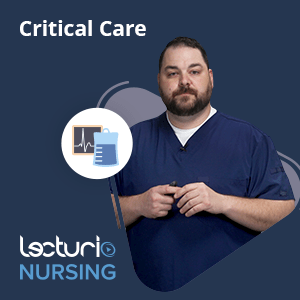Different patient populations, different nursing responsibilities, and unique processes related to workflow and patient management may make some clinical areas a better fit for you than others.
If becoming an emergency room nurse is something you’re thinking about, it might be helpful to learn a little more about what emergency room nursing is all about. As a certified emergency nurse myself, I’m going to give you a little insight into what an ER nurse does.
Take the Course: Critical Care Nursing
Start the online critical care course covering all relevant topics for nursing students
What’s the Emergency Room Like?
If I were to describe what it’s like to work in the emergency room, I would think of words like exciting, unpredictable, challenging, and team-oriented.
One of the best things about the emergency room is that it can go from calm to a modern version of organized chaos in minutes. For me personally, this is something I like. The unpredictable nature of the patients coming through the door is something that keeps me excited and engaged.
In a single day, you could be treating patients across the spectrum of age from newborns to the elderly. You can treat patients coming in with a variety of illnesses and injuries affecting any body system. While this is interesting, and often prevents those feelings of boredom from creeping in, it also means you really need to be on top of your game.
The variability in the patients also brings about a unique nurse-to-patient relationship. ER nurses treat patients who are admitted to the hospital as well as patients who are discharged directly from the ER. Managing a patient from start to finish is a unique experience. You can see them on arrival and often are able to see the patient’s issues resolve to allow them to return home. For some nurses, this leads to a great sense of satisfaction in their role.
Another great thing about working in the ER is that you have your physicians and advanced practice providers right there with you. This creates a great sense of teamwork by allowing you to work right alongside them. It also means that if you need them for something, they are much more accessible. No chasing down doctors for orders or waiting for them to call you back. They are right there working with you.
What Does an ER Nurse Do?
When a patient comes to the ER, you can break their stay in the emergency room into stages. Within each stage, there are certain roles and responsibilities for the ER nurse to be aware of so that the patient is managed promptly and appropriately.
Triage
The ER isn’t a first-come-first-serve type of business. Every patient coming to the ER needs to be triaged. The point of triage is to get the patient to the right resources at the right time. When a patient is being triaged, the triage nurse will get information like the reason for the visit, medical history, vital signs, and any treatments prior to arrival. With this information, the nurse can assign the patient a priority level indicating how quickly the patient needs to be seen.
Who that triage nurse will be depends on the specific institution you’re working for. Working in the triage role is often something that comes with experience because you need that experience to quickly assess a patient for risk and to respond. Once found to be competent in that role, you could be working in triage one shift and then return to a patient assignment for the next.
Assessment and management
After the patient has been triaged, they will be seen by the doctor or the advanced practice provider who, based on their assessment, will place orders. The nursing orders can then be carried out by the ER nurse. The ER nurse also needs to make their own assessment and document accordingly.
Admission or discharge
When all the tests are completed and we have results, it’s time for the doctor to decide the next steps. If the patient requires additional care or treatment, they will most likely be admitted. If the patient’s problem has been fixed, or they can be better helped by following up with their doctor after leaving the ER, they will be discharged.
When a patient is admitted, the ER nurse will need to give some form of a report to the receiving nurse. If the patient is discharged, the discharge paperwork will need to be discussed with the patient, which includes things like patient teaching and follow-up instructions.
Within these stages of the ER visit, the emergency room nurse will find themselves responsible for things like:
- Patient assessment and reassessment
- Patient safety
- Adaptability to a variety of patient types and conditions
- Escalation of changes in the patient’s condition
- Communication with the patient and other staff
- Interdisciplinary collaboration
- Patient teaching
- Documentation
- Upholding HIPPA and EMTALA regulations in a fluid environment
- Preserving patient privacy
Studying nursing has never been easier.
Set yourself up for success with Lecturio.
ER Nursing Skills
Because ER nurses need to be able to treat any patient that comes through the door, their skillset needs to be equally broad. ER nurses need to be able to get the job done efficiently in an unpredictable environment. This means they need some less tangible, but still necessary skills to survive:
- Be able to work well under pressure
- Be able to prioritize patients’ needs
- Be able to tolerate high patient turnover
- Think critically and solve problems
- Be able to support patient family members and parents concerned about their loved ones
- Be able to think autonomously
- Be able to appropriately cope with the experience of witnessing extremely traumatic and tragic events
ER nurses are also very hands-on and develop many skills in taking care of patients. Depending on what state you are working in, here are some clinical skills essential to ER nursing:
- IV insertion
- Blood specimen collection
- Straight catheterization or urinary catheter insertion
- 12-lead EKG and cardiac rhythm interpretation
- Defibrillation and cardioversion
- Assisting providers with invasive procedures
- Blood product administration
- Nasogastric or orogastric tube insertion
- Wound care
- Medication calculation and titration
- Assisting with procedural or moderate sedation
Tips on Becoming an ER Nurse
There are a variety of opinions on whether a nurse should be hired into the emergency room directly out of nursing school. Not many hospitals will do so without a formal residency program. More often than not, they will require a year of nursing experience. Independent of your exact timeline, if becoming an ER nurse is something you would like to work toward, here are some tips for making that journey.
Residency or fellowship programs
If you’re really thinking you want to work in the emergency department, start looking for an ER nurse residency or fellowship program. Residency programs are generally designed for new graduate nurses, whereas fellowship programs are designed for nurses with some experience. Either program will set you up for success in the ER.
Get a job in The ER while still in nursing school
If you haven’t finished nursing school yet, and ER nursing is something you’re thinking about, consider getting a job in the ER now.
Many emergency rooms love hiring nursing students as patient care technicians. Working in this role will give you a great behind-the-scenes look at what the ER is like and help you develop relationships with the staff, potentially setting you up for future promotion to an ER nurse when you graduate.
Related videos
Shadow
If getting a job in the ER isn’t an option, search for an opportunity to shadow some nursing staff. There are often some hoops to jump through, as the hospital needs to ensure the legal aspects of your observation are covered, but it’s a great way to gain insight into a day in the life of an ER nurse. It’s also another great way to meet people like staff and managers who may play a role in hiring you.
Professional development
Start reinforcing your appreciation for lifelong learning ASAP. This means taking additional classes and courses to expand your knowledge base and skill set. It’s going to diversify your experience and make you more marketable. Courses to consider taking would be offerings like Advanced Cardiac Life Support (ACLS) or Pediatric Advanced Life Support (PALS) which are often required to work in the ER.
You may also want to consider taking skill-based courses like an EKG cardiac rhythm interpretation course or a course on IV insertion. These courses can help you in a variety of clinical areas but will be especially helpful in working toward the ER.
My Experience
I consider myself fortunate in that I was hired into an emergency room right out of nursing school. It was a great decision and an opportunity that I am still very grateful for. That said, it wasn’t always an easy journey. There was a ton of information I needed to learn and many skills to refine, all of which took time.
My colleagues prepared me well through orientation, but there was a lot of work I needed to do on my own. Every time I came across a medication or a condition I didn’t know about, I would look it up. I took every opportunity to learn from the doctors and advanced practice providers because it made me a better nurse. Nobody in the ER has time to spoon-feed you information, you need to go and get it. You need to own your growth as a nurse.
If you’re thinking about becoming an ER nurse after reading this, I say go for it. It’s definitely not for everyone, but you just might find your niche. Yes, you will feel overwhelmed at times, and that’s expected. Enter with a humble heart while being ready to learn, and you will likely be very successful.





